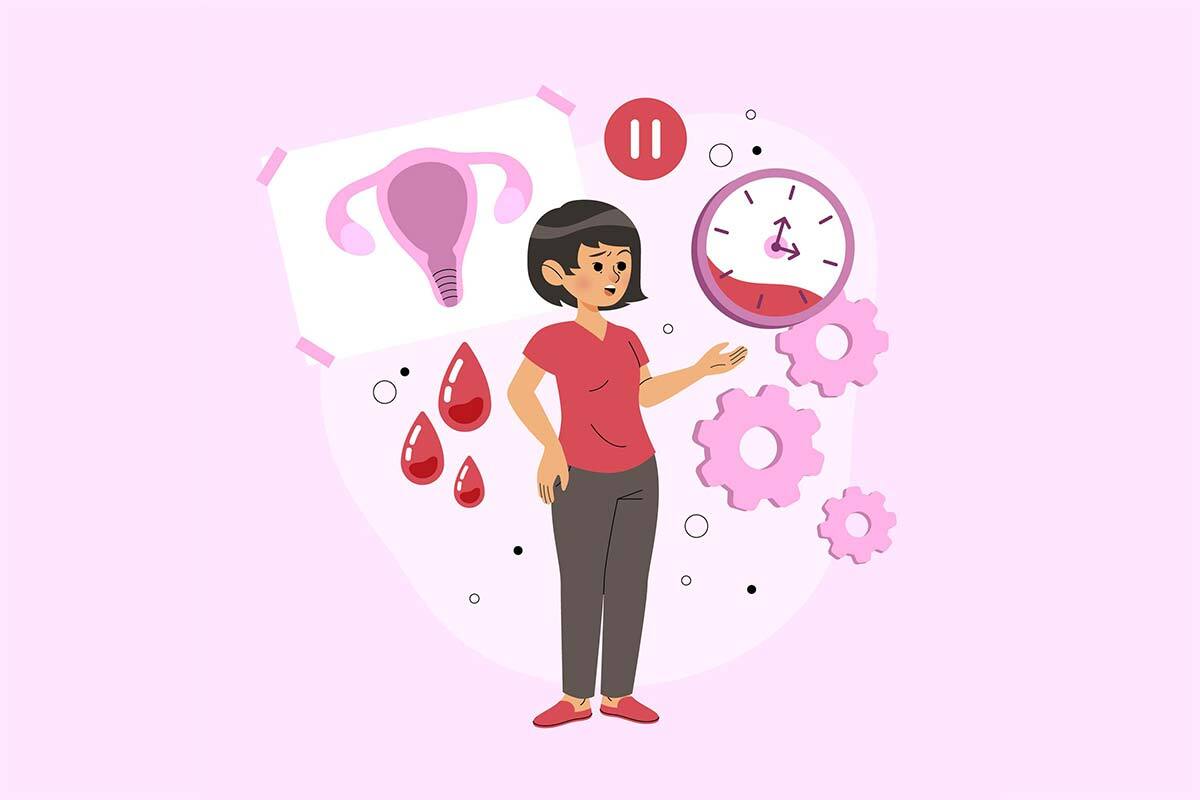Menstrual disorders

Period Problems!
Menstruation (also known as a period) is a natural biological process, whereby the lining of the uterus is shed with an unfertilized female egg via vaginal bleeding. The whole process is controlled by several hormones in the body. Issues with menstruation are an extremely common concern for many menstruators. The most notable issue is the absence or delay of a period, but concerns can also include the presence of irregular periods, heavy prolonged periods or excessive menstrual bleeding, and the presence of painful periods.
To understand what is abnormal and a concern, it is first important to know what is normal.
So, what is normal?
Menstruation begins between the ages of 8 to 13 years (on average at 11 years of age), and this is known as menarche. A menstruator bleeds approximately every 21 to 35 days (on average every 28 days from the first day of a period till the first day of the next period), with vaginal bleeding lasting between 2 to 7 days (on average 5 days). Menstrual bleeding should not be so heavy that it causes very frequent changing of menstrual hygiene product (e.g. must change a menstrual pad or tampon more often than every 4 hours). Shearing uterine contraction forces causes the uterine lining to shed during menstruation. These contractions can result in abdominal pain and pain in the lower back and thighs. Whilst an element of pain is considered normal, the pain should not be so severe that it interrupts daily activities, such as going to school or work.
A Missing period
Absent or missing or infrequent periods are probably the most common menstrual complaint! Whilst some menstruators do bleed exactly every 28 days, most menstruators will experience their period a few days before or after the 28-day mark – this is normal.
If menstruation has not begun by the age of 16 years, it is important to seek medical advice early as this can occur due to genetic reasons or due to hormonal imbalances.
If a period is absent for more than 35 days, it is also important to seek medical advice. There are numerous causes for a missing period including:
Pregnancy
Stress
Weight changes (sudden weight loss or gain)
Excessive exercise
Thyroid illnesses
Conditions like Polycystic Ovarian Syndrome (PCOS)
Breastfeeding
Contraception and certain medication
Menarche
Menopause (when menstruation ends) and the perimenopausal period (the time before and after menopause) can have irregular and absent periods.
Irregular period
Irregular periods are periods that come more frequently than every 21 days or more than every 35 days, causing a variation in the length of the menstrual cycles. Causes can include:
Stress
Weight changes (sudden weight loss or gain)
Excessive exercise
Thyroid illnesses
Conditions like Polycystic Ovarian Syndrome (PCOS)
Menarche
Menopause
Heavy menstrual period
Heavy menstrual periods are periods that last longer than 7 to 10 days or if the menstrual pads or tampons have to be changed every 2 to 3 hours. This requires urgent medical attention. Causes of heavy menstrual periods include:
Growths in the uterus; fibroids or polyps.
Cancer of the uterus or cervix.
Intrauterine contraception such as the Intrauterine Copper Devices
Hormone-related problems like Polycystic Ovarian Syndrome (PCOS)
Bleeding disorders
Non bleeding-related disorders such as liver, kidney, or thyroid disease
Painful period
Whilst it is normal to experience cramping and mild pain before and when menstruating, the pain should not be so severe that it interrupts day to day activities. If menstrual pain is not relieved by measures such as simple painkillers (paracetamol if not allergic), hot water bottles, gentle exercise/yoga and rest, it is important to seek medical advice to find if there any underlying causes for the menstrual pain.
Sometimes no underlying reason can be found for the pain, but the following causes can give rise to excessive menstrual pain:
Fibroids
Endometriosis
Polycystic Ovarian Syndrome (PCOS)
Sexually Transmitted Infections (STI)/Pelvic inflammatory disease
Ovarian cysts
Other non-gynaecological illnesses (such as appendicitis, etc)
Intrauterine contraception such as the Intrauterine Copper Devices
Premenstrual Syndrome (PMS)
The hormonal changes that occur just before and during menstruation can cause significant psychological and physical symptoms. Psychological symptoms include mood swings, anxiety, depression and feeling emotional. Physical symptoms include feeling bloated, breast tenderness, headaches and changes in skin/hair, just to mention a few. If these symptoms are so severe that it interferes with daily activities, it is referred to as Pre-Menstrual Dysphoric Disorder (PMDD).
Simple lifestyle changes such as regular exercise, healthy balanced meals, better sleep, avoiding smoking/alcohol and reducing stress can improve symptoms. Medication can also significantly improve symptoms and hence it is important to consult a medical doctor if experiencing any symptoms of PMS/PMDD.
Conclusion
Understanding menstruation and its’ disorders can empower individuals to seek timely medical care and choose healthier lifestyle choices. If you or someone you know are experiencing menstrual challenges, do seek medical attention by speaking or visiting:
Your local midwife
Local MOH office
Nearest government or private hospital
The Centre for Family Health at the Family Planning Association of Sri Lanka (+94112555455, No. 37/27, Bullers Lane, Colombo-07).
.png)



